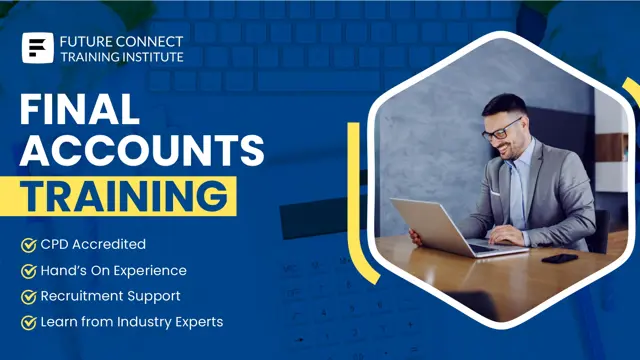
Final Accounts Training
Ideal for aspiring final accountants. Covers theory & practice. CPD certified, taught by experienced professionals.
Future Connect Training and Recruitment Ltd
Summary
- Flexible payment options available - Pay in 12 months installments with 0% interest
- Other payment...
- Tutor is available to students
Add to basket or enquire
Location & dates
Manchester
Lancashire
M26DN
United Kingdom
Hagley Road
BIRMINGHAM
West Midlands
B168QG
United Kingdom
Havelock Place
HARROW
Middlesex
HA11LJ
United Kingdom
4 Albert Place
FINCHLEY CENTRAL
London
N31QA
United Kingdom
Overview
Mastering Final Accounts: Unlocking the Secrets to Summarising a Company's Financial Activity with Confidence and Expertise. We understand final accounts are crucial for anyone working in finance or accounting.
Therefore, this course is designed to provide learners with a comprehensive understanding of final accounts, including their purpose, key components, and how to prepare them.
Description
This module provides an introduction to final accounts, including their purpose and importance. It covers the different types of final accounts, including income statements, balance sheets, and cash flow statements. Learners will gain an understanding of why final accounts are prepared and who uses them.
FAQs
Q: What are final accounts?
A: Final accounts are financial statements prepared at the end of an accounting period, summarising a company's financial activity. They include income statements, balance sheets, and cash flow.
Q: Why are final accounts important?
A: Final accounts provide a snapshot of a company's financial health and performance. They are used by investors, creditors, and other stakeholders to make informed decisions about the company.
Q: Who prepares final accounts?
A: Final accounts are typically prepared by a company's finance or accounting team.
- The Income Statement
This Final accounts module covers the income statement, which shows a company's revenue and expenses over a specific period. Learners will gain an understanding of the components of the income statement, including revenue, cost of sales, gross profit, and operating expenses. They will also learn how to calculate net profit and how to analyse the income statement.
FAQs
Q: What is the income statement?
A: The income statement is a financial statement that shows a company's revenue and expenses over a specific period.
Q: What are the components of the income statement?
A:The components of the income statement include revenue, costs of sales, gross profit, and operating expenses.
Q: How do you calculate net profit?
A: Net profit is calculated by subtracting total expense from total revenue.
- The Balance Sheet
This Final accounts module covers the balance sheet, which provides a snapshot of a company's assets, liabilities, and equity at a specific point in time. Learners will gain an understanding of the components of the balance sheet, including current assets, fixed assets, current liabilities, and long-term liabilities. They will also learn how to analyse the balance sheet, Final accounts and calculate key ratios.
FAQs
Q: What are the balance sheets?
A: The balance sheet is a financial statement that provides a snapshot of a company's assets, liabilities, and equity at a specific point in time.
Q: What are the components of the balance sheet?
A: The components of the balance sheet include current assets, fixed assets, current liabilities, and long-term liabilities.
Q: How do you analyse the balance sheet?
A: Analysing the balance sheet involves calculating key ratios, such as the current ratio and debt-to-equity ratio, and comparing them to industry benchmarks.
- The Cash Flow Statement
This module covers the cash flow statement, which shows a company's cash inflows and outflows over a specific period. Learners will gain an understanding of the components of the cash flow statement, including operating activities, investing activities, and financing activities. They will also learn how to analyse the cash flow statement and calculate key ratios.
Who is this course for?
- The course is designed for anyone working in finance or accounting, including professionals who are responsible for preparing final accounts, analysing financial statements, or making financial decisions.
- It is also suitable for individuals who are looking to gain a comprehensive understanding of final accounts, including their purpose, key components, and how to prepare them.
- Whether you are an experienced finance professional or just starting out in your career, this course will provide you with the knowledge and skills you need to succeed.
Career path
Financial Accountant
Questions and answers
Reviews
Currently there are no reviews for this course. Be the first to leave a review.
Legal information
This course is advertised on reed.co.uk by the Course Provider, whose terms and conditions apply. Purchases are made directly from the Course Provider, and as such, content and materials are supplied by the Course Provider directly. Reed is acting as agent and not reseller in relation to this course. Reed's only responsibility is to facilitate your payment for the course. It is your responsibility to review and agree to the Course Provider's terms and conditions and satisfy yourself as to the suitability of the course you intend to purchase. Reed will not have any responsibility for the content of the course and/or associated materials.


